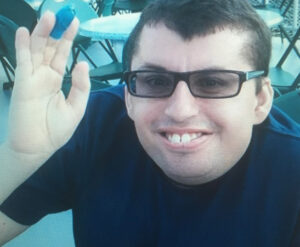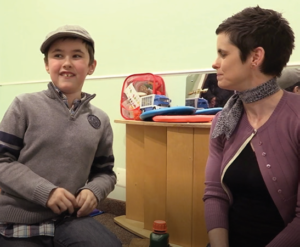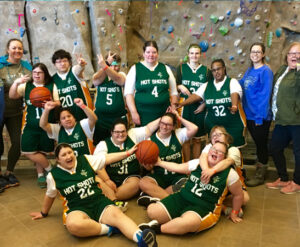Having a disability shouldn’t mean being excluded. When you support the Arc NW, you help include people with intellectual and developmental disabilities in our local communities and empower them to get the support they need to live their best lives. Here are some examples of your impact in action:

Salik
I am the parent of a young man, Salik, with multiple developmental disabilities including cerebral palsy, cognitive impairment and epilepsy. He and I have had an exciting and challenging journey these past 34 years.
Salik was a student in the Detroit Public School system for 26 years, attending a number of center-based programs for students who were labeled “severely mentally impaired”. He enjoyed school, especially the bus ride, and had some great teachers who made him “work”, but I regret he spent his school days in segregated settings with other students who had similar behaviors and challenges. Like Salik, his classmates had intellectual limitations; many did not communicate verbally, and some were self abusive. He had few opportunities to pattern more appropriate behaviors at school. Salik’s life has since made a 360 degree turn in terms of who he spends his time with and how he lives his adult life.
Beginning when he was a pre-teen, Salik received respite supports from GDLLC (now NSO/Life Choices) which was and still is funded through Detroit/Wayne County CMG Agency. This was long before the MCPN system (and Consumer Link), that is now in place. Salik was part of a program that paired him with individuals who would spend time with him for a few days, perhaps a weekend. He would hang out and stay at their homes. One young lady drove a convertible (which he loved), took him to Hart Plaza for festivals with her friends and to church with her family. We also participated in the Family Friend program which gave us the opportunity to hire a friend to stay with Salik and use the Rose Kennedy and Cyprian respite centers. Respite supports gave both of us a break. I have always believed that Salik needs space away from me as much as I do from him. This program worked for us.
As Salik got older, personal support became more essential since I worked full-time and we both continued to need our independence on a regular basis. We were able to leverage Medicaid funds to get after-school and weekend personal support. The new staff were there to get him off the bus and take him for outings on weekends. Today, Salik has many Person Centered Plans, a number of different support coordinators from NSO/Life Choices, and the implementation of self determination practices. Salik lives a busy adult life. He and I hire staff and work with a flexible budget that gives him the opportunity to use his support hours as he chooses in order to live a fully included life. One member of his staff is his age and they go to games, parties, and other venues young people enjoy. He has “blossomed” (my word to describe him). Although he still has very limited verbal communication, he has developed his own basic signage to communicate what he wants. His self-abusive behaviors have decreased. I attribute these changes to the fact that he spends his time with people in his community and in his home that do not have disabilities and he is just one of the crowd — a good, good thing for Salik.
Our journey has been exciting and challenging! Our hope is that self determination continues to move forward and reach every individual who seeks to create a life for him/herself.
Elizabeth
I am a father of two adult daughters. My eldest daughter, Elizabeth, has significant cognitive and physical disabilities. She is nonverbal and walks with a the assistance of a walker.
In 1980, my wife and I were excitedly awaiting the birth of our first child. We were the prototype new age couple: hard working, upwardly mobile, in charge of our lives. My wife followed her doctors’ every suggestion, ate an extremely healthy diet, and did all the right things. We reserved the special birthing room at the hospital…we were ready.
When my wife’s water broke, we headed out for the hospital with our Lamaze goody bags in hand. After a couple of hours of labor, the doctor determined that the baby was breached and recommended a C-section. I was sent to a waiting room.
As I paced back and forth like some character from a 1940’s comedy, a resident doctor came in and told me that I was the father of a baby girl, but there were some complications. The walk from the waiting room to the recovery area where my wife was seemed like the longest walk I have ever taken. The resident began listing multiple birth defects my new daughter was born with. My mind raced like crazy. Up until this point, my wife and I believed there were no challenges we couldn’t handle. Upon hearing about all the problems our new baby would be facing, the thought crossed my mind that maybe it would be better if she didn’t survive… Then I experienced the single most miraculous moment of my life. I came through the doors into the recovery area just as the nurse pushed Elizabeth, my new daughter, towards the nursery. The moment I saw her was like being struck by lightning. I would have fought lions to protect her. Perhaps I was naïve, but my hopes for Elizabeth’s future then, as it is now, is that she lives life to its fullest.
Fortunately Liz was born at the right time, in the right place, with the right people and resources to allow her to do just that. Elizabeth’s early life was typical for children with significant disabilities; including special segregated schools, therapies up to our ears, etc. Then my wife and I went to a presentation on supported employment at a local Arc when Liz was three. Obviously employment was not something at the top of our minds as it concerned Liz, but more importantly the presentation gave us something no one else in the system was giving us…hope. We learned about people working and being part of their community regardless of their abilities.
With our new found hope, we began investigating inclusive education as an option for Elizabeth’s education. It didn’t make sense to us to provide speech therapy in a classroom with all non-verbal students. So after some difficult discussions with the local school district, we moved our family to another school system where Liz was fully included and ultimately walked graduation with her non-disabled peers. Next, Elizabeth worked with a pilot transition project that involved real cooperation between the schools and adult services. Liz was hired at Home Depot where, to date, she has worked for over ten years.
In 2007, Liz moved into her own condominium with two non-disabled roommates who provide the support Liz needs. Elizabeth’s life and home couldn’t be more typical; parties, guy watching, loud music, everything every other young, single women like to do. Liz lives life to the fullest and she’s lovin’ it.
Gabriel
I met Gabriel and his mom in September 2008. Gabriel was 9 years old and in third grade at a charter school in Detroit. Although Gabriel’s grades were acceptable, he was struggling and spent many afternoons in the office because of his behavior. This current school was Gabriel’s third elementary school and he was receiving no extra support from school personnel to handle the daily routine of school, peer and teacher interactions, and the unstructured times of lunch and recess.
Gabriel was diagnosed with attention deficit hyperactivity disorder and his mom had notified each school he attended. With each transfer, his mom hoped that the school personnel would provide the supports that Gabriel needed to be successful and make friends. She had done a lot of research and passed this information on to Gabriel’s teachers and administrators. At this charter school, the administrators refused to acknowledge Gariel’s difficulties with peer interactions, impulsivity which led to fights on the playground and his difficulty in handling other students’ behavior towards him. Gabriel was being suspended almost weekly and was still spending many days sitting in the office. The administrators seemed to be there to dole out punishments and reprimands, but rarely to address the issues with Gabriel in a one-on-one conversation to help him understand the consequences he received or to provide personnel support.
In September of 2008, Gabriel’s mom contacted The Arc of Northwestern Wayne Count to help get the necessary support and services so Gabriel could be successful in school. It wasn’t until December 2008 that Gabriel was formally evaluated and found eligible for special education services. Gabriel was also determined to have an emotional impairment which impacted his relationships with his peers and teachers.
By the time the evaluations were completed, Gabriel’s mom had already decided that Gabriel needed to attend a different school. The teachers and administrators at the charter school were unresponsive to her help and provided information. The social work services that Gabriel was supposed to receive were rarely implemented. No changes were made in working with Gabriel and he continued to struggle academically and socially.
In February 2009, Gabriel’s first IEP was held at his new school in Detroit. Gabriel also received an OT evaluation to address possible sensory issues that Gabriel was having in relation to noise in his class. Immediately, services were implemented and the principal at the school took an active role in Gabriel’s education. Gabriel now sees a social worker weekly and a resources room teacher daily to help him with his academic work. Gabriel’s teachers receive assistance from the occupational therapist to develop classroom strategies to help Gabriel focus and block out typical classroom noises agitate Gabriel tremendously.
Gabriel spent much time visiting the principal over the last year and a half of school. At times, it was a reprimand to address his behavior on the playground or at lunch, but a lot of the time it was to play chess or talk about a book that Gabriel read. Gabriel and the principal formed a nice bond and Gabriel knew that he could talk to the principal if he ever had a problem with which he needed help. The principal is soft spoken, respectful and has a good understanding of Gabriel and what he needs to be successful in school. Gabriel has received a lot of support from the resource room teacher, and the social worker has been available to help Gabriel address his impulsive reactions to students’ comments and actions. They help him learn to identify when he is having a tough day. Gabriel’s suspensions disappeared once school personnel started working actively with Gabriel to address his sensory needs, as well as his need for clear expectations and structure in his day.
Gabriel graduated 5th grade this past June and received many awards and certificates. Gabriel is looking forward to starting middle school. He is learning to identify what sensory strategies will work for him in his class and how he can better relate to his peers and teachers. He has high hopes that middle school will start off on the right foot.
Mary
Mary is a funny, lively, 60-year-old lady who doesn’t look, or act, her age. Mary is familiar with almost every musician (popular and old timers). Once she hears a song, she can identify the song and the artist immediately. Mary loves to be on the go, no matter what she is doing. Mary is a true success story of a lady who receives the support she needs to live her life the way she desires.
Mary lives in Detroit, owns her own home, has a housemate (who is also a friend), and receives supports through the community mental health system. Because of Mary’s medical needs, she likely would have been put in a more restrictive setting if she did not receive the help and services she has today. Mary’s family left her the family home. Mary grew up in the house she lives in today. Her house is in a rough area of town (house are not kept up, people come and go), but Mary does not want to move. She has established relationships with neighbors who have lived there for a while and they look out for her. Living in the house has not always been easy. Mary’s house was falling apart several years ago and she wasn’t sure she was going to be able to stay because of the condition. With the help of The Arc of Northwestern Wayne County and Community Living Services, Inc., she has been able to get her home repaired and remodeled so she can remain living there.
Mary needs 24-hour staff support to live independently and have a good quality of life. The staff who help her at her home take her anywhere she needs to go. Mary attends concerts, plays and musical events. She goes to Franeknmuth, Cedar Point, Greenfield Village, attends her own church on Sundays, among many other community activities. Mary decides where she wants to go and with whom she spends her time. Her life didn’t always look like this. There was a time when Mary had staff who helped her at her home, but never took her anywhere except for church. Mary was not very happy and wanted to get out more.
She loves to be on the go and didn’t like being at home all the time.
When Mary is asked if she is happy with her life, her answer is always “YES”. She loves her home, the staff who help her, her housemate, and being able to go to the places she chooses.
Mary is a true example of living life to the fullest and is a real success story.



